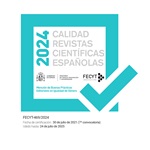Representación y defensa jurídica en los siglos finales de la Edad Media española. El caso de Soria. (RI §427592)

Representation and legal defense in the ending centuries of the Spanish middle ages. The case of Soria -
Gilberto Soriano Calvo
En Roma se regularon, al menos a partir de un determinado momento, las profesiones jurídicas. Pero, desde que cayó el imperio romano de occidente hasta el siglo XIII la labor de representar a otro podía ser compatibilizada con la de exponer argumentos en favor de los intereses defendidos, dada la escasa complejidad de la normativa aplicable. Con la llegada del ius commune se potenció el ejercicio en los procesos judiciales de la argumentación jurídica, dando lugar no solo a que se citaran las normas sino a que se explicara cómo y porqué jueces y doctrina habían interpretado el sentido de cada una de ellas. Con esto se volvió a precisar la presencia en el juzgado de quien expusiera por la parte las alegaciones jurídicas, ahora mucho más complejas. Se había potenciado la figura del llamado “vocero”. Posiblemente aquellos que se dedicaban antes profesionalmente a representar y defender a otros ante los jueces se vieron afectados por una disminución de ingresos económicos, procedente de la necesidad de usar dos profesionales donde antes bastaba con uno, que pudieron dar lugar a ciertos resquemores. Este artículo trata de investigar este proceso.
I. Introducción. II. Breve resumen de la evolución de la necesidad de representante y defensor jurídico en general y en particular en juicio en Castilla León antes de Alfonso X de Castilla (mediados del siglo XIII). III. La penetración del ius commune y su influencia en las actividades de representación y defensa judicial. IV. Regulación de las figuras de “vocero” y “personero” en el Fuero de Soria, manuscritos de la Biblioteca Nacional y del archivo Histórico Municipal de Soria. V. Conclusiones. VI. Abreviaturas usadas. VII. Fuentes. VIII. Bibliografía. IX. Webgrafía.
In Rome, at least from a certain point on, the legal professions were regulated. But, from the fall of the Western Roman Empire until the thirteenth century, the task of representing another could be made compatible with that of presenting arguments in favour of the interests defended, given the low complexity of the applicable regulations. With the arrival of the ius commune, the exercise of legal argumentation in judicial proceedings was enhanced, giving rise not only to the citation of the rules but also to the explanation of how and why judges and doctrine had interpreted the meaning of each of them. With this, the presence in court of the person who presented the legal arguments, now much more complex, was once again specified. The figure of the so-called "vocero" had been strengthened. Possibly those who were previously professionally dedicated to representing and defending others before judges were affected by a decrease in economic income, from the need to use two professionals where previously one was enough, which could give rise to certain resentments. This article attempts to investigate this process.
I. Introduction. II. Brief summary of the evolution of the need for a legal representative and defender in general and in particular in court in the Iberian Peninsula before Alfonso X of Castile (mid-thirteenth century). III. The penetration of the ius commune and its influence on the activities of representation and judicial defense. IV. Regulation of the figures of "spokesman" and "personero" in the Fuero de Soria, manuscripts of the National Library and the Municipal Historical Archive of Soria. V. Conclusions. VI. Abbreviations used. VII. Sources. VIII. Bibliography. IX. Webography.

 DIRECTORA
DIRECTORA